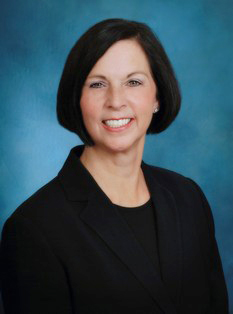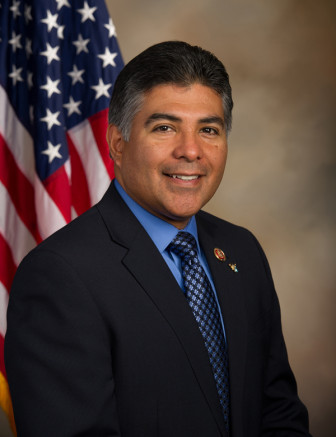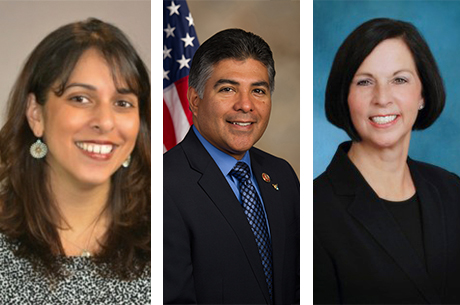WASHINGTON — The Lucas County Juvenile Detention Center in Toledo, Ohio, has 125 beds.
On Wednesday, only 17 of them were occupied, says Judge Denise Navarre Cubbon, of the Lucas County Juvenile Court.

Lucas County
“We have to educate the community,” Cubbon said. “We have to let them know what’s going on, how important it is for us to serve these kids so they don’t just keep coming back and back and back again.”
Cubbon’s proud of that fact, she said at a Capitol Hill briefing on community-based alternatives to detention for youths who become involved with the juvenile justice system.
Lucas County, where incarceration of juveniles has declined steeply in recent years, provides a dramatic example of an emerging trend among jurisdictions nationwide that are moving away from locking up kids.
The northwest Ohio county brings together the Department of Youth Services, the courts, schools, social workers, probation officers and mental health providers to work to safely divert juveniles from detention. The program relies in part on state funding.
Cubbon said Wednesday that youth delinquency is often the product of mental illness, trauma, negative family influences, misbehavior in school, substance abuse or developmental disabilities.
In many cases, she said: “They should not be in secure detention. … So it becomes incumbent upon us to develop some sort of continuum of care in our community so we can address those … risk factors that are impacting a kid’s behavior.
“We should be able to make decisions about their futures. [But] I would submit to all of you if your judges are only looking at incarceration … incarceration is always going to be the default order. It’s always going to happen.”
Cubbon stressed that as a juvenile court judge she must balance the desire for rehabilitation with the community’s need for safety. Some youths, such as those who commit violent crimes, need to be locked up, she said. And she underscored the importance of valid screening and assessment tools.
But she said the overwhelming majority of kids on her docket — most of them African-American males — simply need strong direction and services in the community. An assessment center — opened with funds saved by reducing staff at the juvenile detention center — helps pair youngsters with services.
“We have to educate the community,” Cubbon said. “We have to let them know what’s going on, how important it is for us to serve these kids so they don’t just keep coming back and back and back again.”

United States House of Representatives
“We’re the only country that will actually give a child a life sentence without the possibility of parole. We’re the only country that does that and yet we call ourselves a leader of the free world,” said U.S. Rep. Tony Cardenas.
That theme pervaded the Sept. 10 briefing, co-sponsored by the National Council on Crime & Delinquency and Youth Advocate Programs Inc. (YAP), a nonprofit, Washington-based organization that provides community-based alternatives to out-of-home placements in 17 states.
The Lucas County Juvenile Court works with YAP to provide alternatives to detention.
Mary McClymont, president of the Washington-based Public Welfare Foundation, delivered a scathing indictment of overreliance on incarceration of youths who shouldn’t be locked up in the first place.
“Incarceration is simply bad in every respect for these youths,” she said. “It’s bad because it keeps kids exposed to harm in these facilities where they have to reside.
“Incarceration is also bad for public safety. We all know the staggering recidivism rates of 50 to 80 percent. And finally, we know that incarceration is just plain bad for our society because incarceration of our kids in this country costs us $5 billion a year. It’s simply unacceptable.”
An attorney, McClymont had handled lawsuits about 25 years ago against youth facilities with rampant violence and a lack of education and rehabilitative services.
“Sadly, these [problems] persist today, as you all know, in these facilities,” she said. She also cited “shocking racial disparities” in the juvenile justice system.
However, McClymont said she’s hopeful about reform prospects as the number of juvenile arrests and the number of kids incarcerated have declined dramatically. State policymakers are realizing overreliance on juvenile incarceration isn’t financially sustainable and is “completely ineffective,” she said.
Rep. Tony Cardenas, D-Calif., said it’s time to stop incarcerating kids for misdemeanors, to stop sentencing juveniles to die in prison and to stop subjecting them to the torture that is solitary confinement.
“We are the most incarcerated place on the planet in numbers and in percentages and in any which way you can think of,” Cardenas said. “We’re the only country that will actually give a child a life sentence without the possibility of parole. We’re the only country that does that and yet we call ourselves a leader of the free world.”
Cardenas, known for his juvenile justice advocacy, told of how he tries to win over conservative lawmakers in Congress by pointing out it costs an average of $88,000 a year to incarcerate a juvenile.

Gary Gately
Shaena Fazal, national policy director for YAP
Shaena Fazal, YAP’s national policy director, said the organization focuses much of its efforts on kids who have the highest risk of being placed outside their homes.
Individualized, 24/7 intervention requires redirecting some funds away from incarceration, as the Lucas County example illustrates. “We have the money,” Fazal said. “We’re just spending it in the wrong place.”
Working with troubled kids, she said, also requires seeing them as individuals: “We meet the kid. We don’t meet the file. We don’t make judgments based on what a file says about a kid because a file is where you collect all the bad things and none of the good things. But if you meet a kid, then you see all of the good things, all the potential and all the promise.”


Pingback: The Case for Abolishing Juvenile Prisons; News Roundup | Reclaiming Futures
Pingback: Public Welfare - Promoting Youth Incarceration Alternatives on the Hill